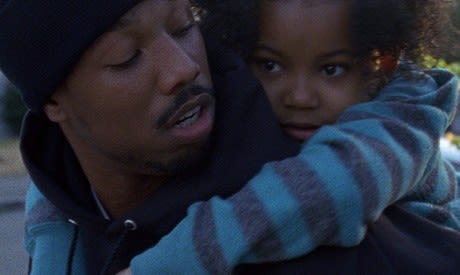On January 1st, 2009, just moments after everyone celebrated the dawn of a new year, an eye witness cell phone video captured a struggle between a group of young men and some police officers on the BART platform at Fruitvale station. After a few aggressive exchanges, a gunshot went off, leaving a young man fighting for his life in front of hundreds of people.
Though this incident has become synonymous with the fight against profiling and police brutality in Oakland, California, it has, in part, been dismissed in other regions as a result of gang violence or drugs. What Ryan Coogler attempts to do with the highly emotional and surprisingly compelling drama, Fruitvale, is put a face to the victim as an identifiable, complex human being with family, hopes and aspirations just like everyone else.
Starting on the morning of December 31st, 2008, Fruitvale documents the daily quotidian of 22-year-old Oscar (Michael B. Jordan). Arguing with his girlfriend Sophina (Melonie Diaz) about past infidelities and sneaking his daughter an extra snack pack for lunch when her mother denies it, he comes across as a flawed but likeable and well-intentioned fuck-up.
These early moments of the film, with Oscar driving around Oakland, witnessing the hit and run of a dog and chatting with his mother Wanda (Octavia Spencer) about their celebratory dinner plans, are rather clumsy. Most of the scenes have little framing or vision, which leaves a frequent discomforting silence and a high school improvisational dynamic.
They're also awkwardly heavy-handed, using flashbacks to Oscar's past dalliances with drug-dealing and prison to emphasize his commitment to cleaning up his act and making his mother proud. We're given a character portrait of an underdog that has overcome obstacles to embody the standard Judeo-Christian morality of the American ethos, being a monogamous husband and loving father.
And while all of this is quite patronizing and even nauseating, Jordan and Diaz do a solid job of giving their rote caricatures some added complexity and humanity. This helps add an identifiable dimension of emotional heft when the inevitable climax unfolds on the BART platform.
Looking past the occasional contrivance—the woman taking the cell phone video of the police brutality incident talked to Oscar earlier at the grocery store—this final act is an intense and powerful example of filmmaking. There is a gritty sense of in-the-moment chaos that forces the viewer into a situation spiralling out of control, rushing through the moments in a real life way that reminds us how quickly bad decisions and confusion can change lives forever.
It's this acknowledgement and awareness of how abruptly terrible things occur, along with a kinetic handling of action that give Fruitvale its lingering power. Without it, the overwhelmingly clumsy manipulation of emotions and perception would boil things down to movie-of-the-week territory.
(The Weinstein Company)Though this incident has become synonymous with the fight against profiling and police brutality in Oakland, California, it has, in part, been dismissed in other regions as a result of gang violence or drugs. What Ryan Coogler attempts to do with the highly emotional and surprisingly compelling drama, Fruitvale, is put a face to the victim as an identifiable, complex human being with family, hopes and aspirations just like everyone else.
Starting on the morning of December 31st, 2008, Fruitvale documents the daily quotidian of 22-year-old Oscar (Michael B. Jordan). Arguing with his girlfriend Sophina (Melonie Diaz) about past infidelities and sneaking his daughter an extra snack pack for lunch when her mother denies it, he comes across as a flawed but likeable and well-intentioned fuck-up.
These early moments of the film, with Oscar driving around Oakland, witnessing the hit and run of a dog and chatting with his mother Wanda (Octavia Spencer) about their celebratory dinner plans, are rather clumsy. Most of the scenes have little framing or vision, which leaves a frequent discomforting silence and a high school improvisational dynamic.
They're also awkwardly heavy-handed, using flashbacks to Oscar's past dalliances with drug-dealing and prison to emphasize his commitment to cleaning up his act and making his mother proud. We're given a character portrait of an underdog that has overcome obstacles to embody the standard Judeo-Christian morality of the American ethos, being a monogamous husband and loving father.
And while all of this is quite patronizing and even nauseating, Jordan and Diaz do a solid job of giving their rote caricatures some added complexity and humanity. This helps add an identifiable dimension of emotional heft when the inevitable climax unfolds on the BART platform.
Looking past the occasional contrivance—the woman taking the cell phone video of the police brutality incident talked to Oscar earlier at the grocery store—this final act is an intense and powerful example of filmmaking. There is a gritty sense of in-the-moment chaos that forces the viewer into a situation spiralling out of control, rushing through the moments in a real life way that reminds us how quickly bad decisions and confusion can change lives forever.
It's this acknowledgement and awareness of how abruptly terrible things occur, along with a kinetic handling of action that give Fruitvale its lingering power. Without it, the overwhelmingly clumsy manipulation of emotions and perception would boil things down to movie-of-the-week territory.
